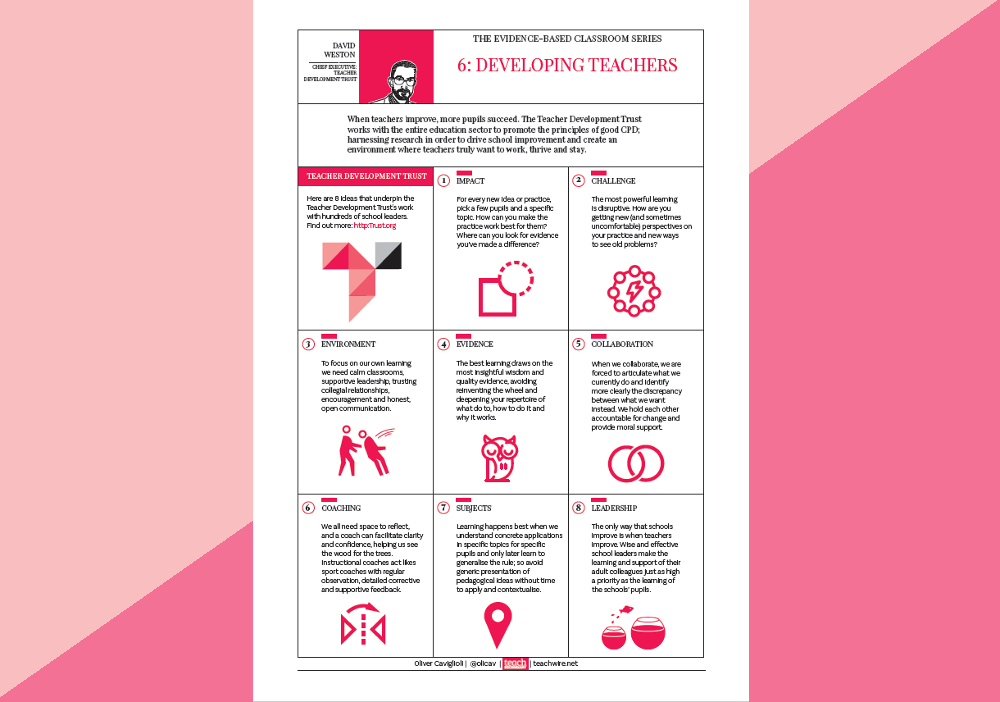Practitioner Enquiry – Could it take the place of CPD?

Gordon Cairns examines how Practitioner Enquiry casts teachers as researchers
of their own practice – but could it ever take the place of CPD?

- by Gordon Cairns
- English and forest school teacher

A growing number of UK schools are encouraging their teaching staff to undertake a ‘Practitioner Enquiry’ as a way to supplement, or even replace their traditional CPD training.
By investing time, resources and academic input into their teaching staff, institutions hope to create conditions in which teachers can investigate aspects of their own teaching practice.
A recent in-depth longitudinal study into a number of such projects found that undertaking a Practitioner Enquiry can have a positive impact.
However, precisely how this impact lands might not be what the practitioner or their school might have expected.
History of Practitioner Enquiry
Of course, the concept of teachers examining their own methodologies has been around for a while. Around half a century ago, Lawrence Stenhouse recognised that teachers were, in effect, researching their own practice whenever they engaged in curriculum development.
In the years since, educational thinkers have continued searching for ways of harnessing the desire of teachers to examine and improve their own practice.
And yet, the multitude of names given to this process reveals just how difficult the search has been for a definitive approach has been. Hence, we’ve seen the emergence of:
- reflective practice
- action research
- teacher research
- practitioner research
- collaborative inquiry
- critical enquiry
- critical collaborative enquiry
These have all been implemented at various points by different educational authorities since the 1980s. By 2019, the Welsh Government had come to favour the term ‘Professional Enquiry’, citing what it saw as “strong evidence to suggest that teachers, like other professionals, find this one of the most effective forms of professional development.”
While there’s now some general agreement that giving teachers the agency to examine their own practice with a view to improvement is a good thing, there’s less uniformity of thought as to what makes a successful study.
With scores of individual projects being carried out across the country aimed at ironing out personal classroom concerns, or simply sourcing evidence to back up an individual hunch, there’s been relatively little research into what actually works, or does not work.
That changed last year, however, following the publication of a study by researchers at the Universities of Brighton and Buckingham, entitled ‘Teacher practitioner enquiry: a process for developing teacher learning and practice?’
Practitioner Enquiry benefits
Academics Brian Marsh and Mark Deacon wanted to discover what made for a successful Professional Enquiry – and conversely, why other projects failed to work.
They established a five-year longitudinal study across five schools in the South of England, looking into the Professional Enquiry of 71 teachers.
Perhaps the biggest surprise from their findings was that, despite the obvious goal of any professional development being to improve young people’s outcomes, there seemed to be scant evidence showing that class teachers researching their own practice were actually doing that.
The data didn’t support an explicit link between undertaking a Practitioner Enquiry and the raising of pupil attainment. This was even the case amongst those teachers who claimed otherwise when presenting their completed work.
The researchers simply found it impossible to disentangle the specific impact of a given enquiry project from all the other elements of a school that naturally work together for students’ benefit.
However, this shouldn’t be taken to imply that creating research projects is pointless. On the contrary, note the report’s authors:
“The findings point to taking part in practitioner research as a valuable form of teacher professional development.
“We found evidence of teachers becoming more confident and more knowledgeable in the collection and use of evidence. Moreover, there is evidence of the participant teachers learning about their own learning.
“For many, the research led to ‘informed reflection’ and it impacted on practice with benefits to their own teaching and leadership. There was a significant impact on the morale.
“As one senior leader said, ‘I think the biggest impact is on teacher thinking rather than the outcome of their projects.’”
Reflective practitioners
A source close to the research adds that conducting a Professional Enquiry was able to make teachers more reflective practitioners.
Participating in academic analysis is another benefit, as once teachers are qualified, they typically won’t tend to read and reflect on what’s out there in terms of academic research.
Practitioner Enquiry can thus be a way of making teachers more aware of the large bank of educational research they don’t have time to read.
Culture of enquiry
Furthermore, the report noted, “There is evidence of improved professional practice, increased teacher agency and confidence, where the teachers constantly reflected on, and evaluated the effectiveness of their activities.”
What makes a Practitioner Enquiry successful?
The researchers found that generally, those participants who “Started with a focused enquiry question undertook work that not only led to changes in their own personal practice, but also had an impact at a departmental level (pastoral or subject teams) and occasionally at a whole school level with changes to policy and practice.”
On the other hand, those projects that were either over-ambitious (such as ‘Enhancing the quality of verbal interactions between students’) or which lacked focus (see ‘Developing academic resilience’) were unsuccessful.
Common problems
And this perhaps reveals the key problem when starting a Practitioner Enquiry. Given that most teachers will be ‘lay people’ with regards to academic research skills, many simply won’t know whether the hunch they have is something that can be measured, quantified or indeed uncovered at all.
You might think that encouraging young people to take part in outdoor learning will improve the quality of their sleep – but how can you possibly quantify that?
And yet, despite this, there are still some benefits for teachers undertaking a Professional Enquiry project. One is that teachers get to ‘re-professionalise’ themselves, through deepening their thinking and understanding of their own practice.
They gain practice in developing their voice, and have the opportunity to both enhance their professional agency and influence the thinking of their professional peers.
Making Practitioner Enquiry a CPD activity
Marsh and Deacon found that turning Practitioner Enquiry into a viable, if not transformative professional development activity requires that a number of conditions be met first. These include:
- the need for ‘a culture of enquiry’ in schools, which could provide teachers with the ecological conditions needed to embark on their project
- respect for their existing knowledge
- support from both senior colleagues and university facilities, enabling practitioners to access any required literature and information
This ‘culture of enquiry’ would also see practitioners regularly developing and controlling the focus of their enquiries, supported by collaborative problem-solving, stimulation and encouragement.
Clinging onto theories
The biggest problem, however, comes when teachers set themselves the task of reading academic papers, peer-reviewed journals and other relevant literature that conflicts with their existing practice and beliefs.
According to one source close to the report, teachers can often become ‘locked’ into certain theories of teaching that were current at the start of their career.
The report’s researchers quote one teacher who was seeking to apply neurolinguistic programming techniques to their classroom behaviour management strategies: “I’ve read some of the research papers. It is not how I’ve been taught. I just can’t believe what I’ve read to be right.”
Practitioner Enquiry example
At the other end of the scale, Nicola Daniel – curriculum leader for English at Broughton High School, Edinburgh – found her Practitioner Enquiry to be a positive experience.
Writing for the General Teaching Council Scotland, she shared how, “This project has led me to a better understanding of how boys learn, and why some aspects of male literacy fall behind girls.
“By being able to explain this to boys, I have found that this has helped boys feel that they are not stupid or weak, but that there is a reason for, say, poor handwriting – and a way to fix it.”
Conclusion
Ideally, Marsh and Deacon’s report into Professional Enquiry will give teachers a dose of realism before they embark on what can be an arduous and complex course of study.
Commencing a deep dive into your own practice probably won’t turn your students into geniuses – but it may well reinvigorate your thinking and sense of agency around your work, both of which are worthwhile goals.
Gordon Cairns is an English and forest school teacher who works in a unit for secondary pupils with ASD; he also writes about education, society, cycling and football for a number of publications.










